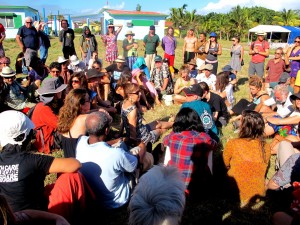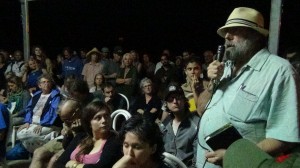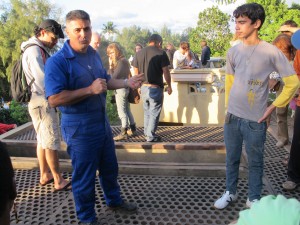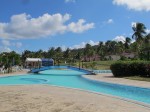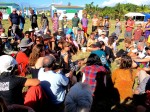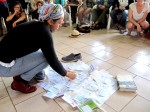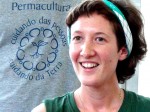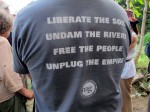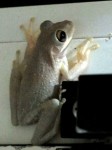The second part of the IPC was the Convergence that took place at the beach resort “Los Cocos”. We stayed five or six people in each bungalow, sparsely equipped, but sufficient for our needs. Some organising and rescheduling of activities made the program run smoothly with five streams of presentations and several open spaces for deeper discussions. Cuban food was on the menu with generous portions of congri (a mix of rice and beans), chicken, fish, yams, cabbage and guava sauce.
Literally hundreds of speakers were on the program, so it was impossible to retain all the learning and resources that was given. In all 423 people attended the convergence.
Video: What people harvested from The Convergence
Read about The Conference here. For an extremely short introduction to Cuba click here.
Keep reading about a few selected highlights of The Convergence and Havana tour beneath.
Permaculture and Capitalism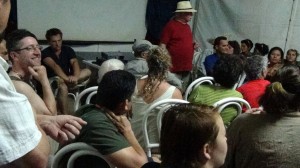
A heated discussion initiated by Scott Pittman was amongst the more controversial, focussing on “Permaculture and Capitalism”. Statements around whether permies are “allowed” to make money and become millionaires from doing permaculture work or be purist anti-capitalists (or something in between) brought forward underlying dogmas about permaculture culture.
What is capitalism and what are the good ways of using money? This question was never answered but several contributions helped to clarify permaculture’s possible acceptable livelihoods. For example the concept of “Permaculture millionaires” would be more palatable to most people as cooperatives rather than individuals.
Permaculture teaching standards
Another heated discussion, also facilitated by Scott Pittman with participation of several permaculture superstars was about “Permaculture and standards in teaching”. One end of the spectrum of opinions regarded Bill Mollison’s original permaculture curriculum as being “sacred” with its emphasis on the elements of the natural world and ecoliteracy being at the heart of permaculture. The other end of the spectrum was teaching permaculture to create ethical business people using all the principles but without ever looking at a plant.
Voices from young teachers raised the question about what the elders expect from new teachers and whether the PDC is starting to be outdated. The younger generation is exploring the field of permaculture and finding new subsections of permaculture focussing only on social permaculture or appropriate technology while still holding true to the ethics, principles and designs as essential. They want to see more diversity in this movement, not less – meaning that education needs to evolve with the movement.
People and Permaculture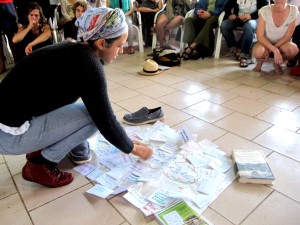
A lot of emphasis was put on people and permaculture, both as the “invisible structures”, organisation and management; and the pedagogical participatory and engaged approach to teach permaculture. Proponents of social permaculture present were amongst others Robin Clayfield and Starhawk and our own Peter Cow.
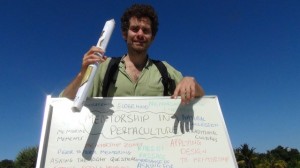 As Eric Toensmeier, US, said, “The real exciting things that are happening in permaculture right now aren’t so much about the plants, because we’ve got a lot of that worked out, but the movement and community building is really where the cutting edge is happening at the moment.”
As Eric Toensmeier, US, said, “The real exciting things that are happening in permaculture right now aren’t so much about the plants, because we’ve got a lot of that worked out, but the movement and community building is really where the cutting edge is happening at the moment.”
Supporting the case for more emphasis on social permaculture were also statements like: “I’ve never seen a community fall apart because they put their plants in the wrong place. Where we generally fail is in the invisible areas of what are the underlying processes and issues, power and privilege which inform the way we work together – or don’t work.”
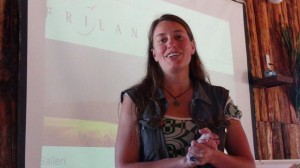 Presentation of EPT at the IPC
Presentation of EPT at the IPC
The convergence was tightly packed with presentations, but a select delegation consisting of Kipper, Hugo Oliviera, Peter Cow and Cathrine Dolleris got a slot of time to share the workings and wonders of the EPT. The aims and meeting structure was explained as well as the VSM. A small but keen crowd attended the presentation, including Robyn Francis, who was impressed and jealous of our ability to get funding and to organise international partnerships in Europe.
Future IPCs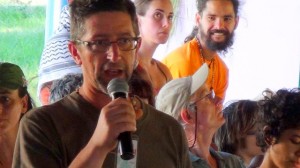
At the close of the Convergence, Andy Goldring reminded everyone that the next IPC will be in 2015 in the UK (perhaps in early September?). He outlined some of the ideas, including a focus on Europe wide permaculture, plans to run part of the conference in London (supported by epic couch surfing), a large camping based convergence in the countryside, and lots of tours around the UK. He also suggested that there could be plenty of fringe workshops, courses and events before and after the IPC so participants can make the most of their time in Europe.
It was decided at the convergence that the following IPC (in 2017) would be in India. There was only a handful of people at the 2013 IPC from the whole of Asia, so this is clearly a region that needs the boost that hosting an IPC will bring. South America was keen to host the IPC in 2017 as well, but India was judged the best.
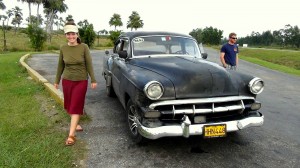 Permaculture carwash
Permaculture carwash
Have you ever heard of a Permaculture Carwash ? Well, neither had we, the IPC travelling permies, before we visited Paolo’s carwash in Patio de la Fe. They love their cars in Cuba, huge, antique chrome-and-fin 1950s US cars. They work as taxis all over Cuba, squeezing up to 7 or 8 people in, and their big, smoky exhaust fumes fill the cities.
Yes, the question immediately arises – how can a carwash be permaculture?
Recycling the water, capturing oil and pollutants and reinvesting money back into the business and organic garden was part of the solution.
The carwash had a filtering system, where the water captured was resting in a ditch until the water was so still that the oil flowed on top and could then easily be skimmed off the surface and taken to a recycling place. The water passed through a mechanic filter and seven successive biological filterings and cleaning recipients using gravity before being pumped back into a tank with water for the carwash. The water was good enough for washing more cars, but not for drinking.
Creative thinking was certainly part of this design, something that could stretch our minds beyond their habitual patterns.
EPT in Jaguey Grande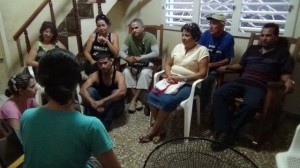
Peter Cow and Cathrine Dolleris had the honour of presenting European permaculture and the EPT to a group of permaculturistas in the small but proud provincial town of Jaguey Grande in Matanzas province. 10 local permies were introduced to the work of the EPT using Mihail Kossev’s great movie from Portugal as a highlight. It was very well received!
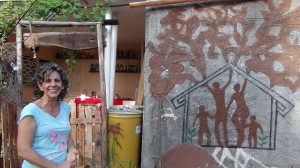 Local permies in Cuba are generally very information hungry as internet access is nearly impossible and computers are rare. We were happy to share a lot of digital resources with our permie hosts.
Local permies in Cuba are generally very information hungry as internet access is nearly impossible and computers are rare. We were happy to share a lot of digital resources with our permie hosts.
It was a great experience! If you plan a trip abroad, go to Cuba and spend time with the lovely couple Juliet and Rogelio (telephone 0053 52940801, no email address currently). They will be delighted to host you and connect you with the local network of permies in Jaguey Grande
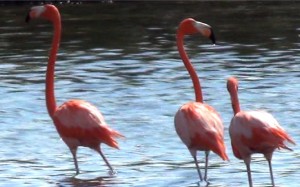 about 120 km southeast of Havana. Their house is 35km from the infamous, and very beautiful “Bay of Pigs” (Bahia de Cochinos), which has awesome diving and snorkelling on coral reefs, and is one of the best places to birdwatch and see wildlife in Cuba.
about 120 km southeast of Havana. Their house is 35km from the infamous, and very beautiful “Bay of Pigs” (Bahia de Cochinos), which has awesome diving and snorkelling on coral reefs, and is one of the best places to birdwatch and see wildlife in Cuba.
For an extremely short introduction to Cuba click here
